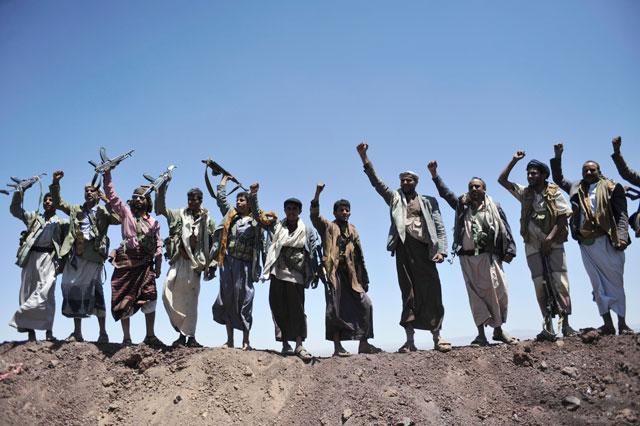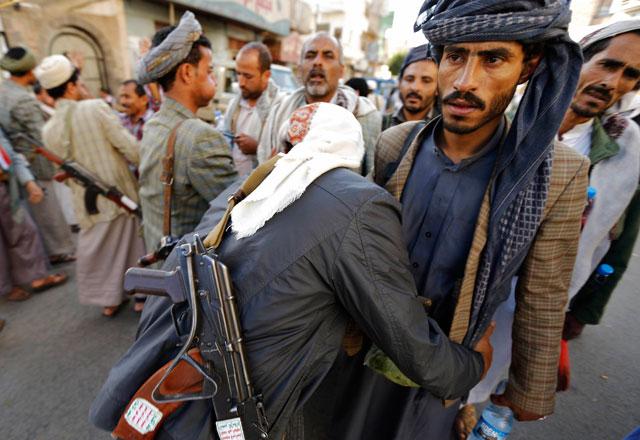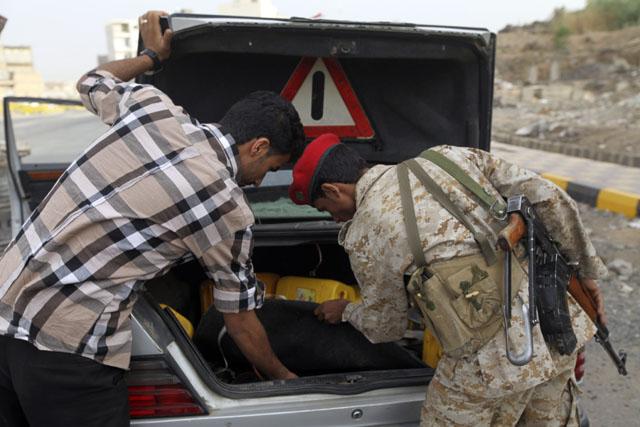You are here
Shiite rebels hold key Sanaa offices after Yemen peace deal
By AFP - Sep 22,2014 - Last updated at Sep 22,2014

SANAA — Shiite rebels guarded government offices and army bases in the Yemeni capital alongside troops on Monday after a UN-brokered peace agreement aimed at ending a week of deadly fighting.
Sunday's hard-won deal, signed by the president and all the main political parties, is intended to put the troubled transition back on track in impoverished Yemen which borders oil kingpin Saudi Arabia and is a key US ally in the fight against Al Qaeda.
Sanaa residents began to venture into the streets as the guns fell silent after a week of deadly clashes between the rebels and their Sunni Islamist opponents, AFP correspondents reported.
Rebel fighters were manning joint checkpoints with troops outside the public offices they entered in their lightning advance on Sunday, which include the government building, parliament, army headquarters and the central bank.
Commanders said they had orders to cooperate with the rebels, known as Ansarullah or Houthis, who had waged a decade-long insurgency in the mountains of the far north before launching a bid for power in the capital last month.
"We are working side by side with Ansarullah to protect public buildings and property," a military police commander told AFP at a checkpoint near the rebel-controlled state radio headquarters.
The interior ministry had called on the security forces on Sunday not to confront the rebels.
The speed of the advance reflected the fragility of the regime three years after a deadly uprising which forced veteran strongman Ali Abdullah Saleh from power.
The rebels brought reinforcements into the capital overnight from their strongholds further north, tribal sources said.
They carried out searches through the night and into Monday of the homes of their Sunni Islamist opponents, multiple sources said.
They included leading figures in the Islah Party as well as General Ali Mohsen Al Ahmar, a veteran army officer close to the Islamists.
Sanaa provincial governor, Abdulqader Hilal, resigned in protest late on Sunday after rebels seized his car at a checkpoint, sources close to him said.
The rebels hail from the Zaidi Shiite community that makes up 30 per cent of Yemen’s mostly Sunni population but is the majority community in the northern highlands, including Sanaa province.
New PM to be named
They have taken advantage of shifting alliances among the region’s Zaidi tribes to advance from their mountain strongholds and lay claim to a stake in power in Sanaa.
Under Sunday’s deal, President Abed Rabbo Mansour Hadi has three days to bring a rebel representative into government as an adviser and to name a neutral replacement for Prime Minister Mohamed Basindawa.
Basindawa tendered his resignation as the security forces surrendered state institutions without a fight on Sunday although it had yet to be accepted by the president on Monday.
In his resignation letter, Basindawa accused Hadi of being “autocratic”, according to the text released by the council of ministers.
“The partnership between myself and the president in leading the country only lasted for a short period, before it was replaced by autocracy to the extent that the government and I no longer knew anything about the military and security situation,” he wrote.
A security protocol to Sunday’s agreement requires the rebels to hand over the institutions they have seized, and once a new prime minister has been named, to start dismantling the armed protest camps they established in and around the capital last month.
But rebel representatives refused to sign the protocol at Sunday’s ceremony.
Rebel spokesman Mohammed Abdessalam said they would only do so once the security forces had apologised for the deaths of rebel protesters during an attempt to storm government headquarters earlier this month.
The deal also requires the president to name an adviser from the separatist Southern Movement which has been campaigning for the secession of the formerly independent south.
The southerners’ boycott of Hadi’s UN-backed plans for the transition has been another major obstacle.
Southern grievances have allowed parts of the region to become strongholds for Al Qaeda in the Arabian Peninsula regarded by Washington as the jihadist network’s most dangerous arm.
UN chief Ban Ki-moon said Sunday’s agreement marked a “positive step towards political stability and peace”, according to a statement issued by his spokesman.
Related Articles
President Abed Rabbo Mansour Hadi warned Tuesday of "civil war" in Sunni-majority Yemen and vowed to restore state authority as Shiite rebels appeared to be in near-total control of the capital.
Shiite rebels and Yemeni tribesmen agreed a ceasefire on Sunday after deadly clashes between the two sides in the Arhab district near the capital Sanaa, state news agency Saba said.
Yemeni authorities on Wednesday accused Shiite rebels of “atrocities” in the northern city of Amran, which they seized in a major advance towards the capital.













